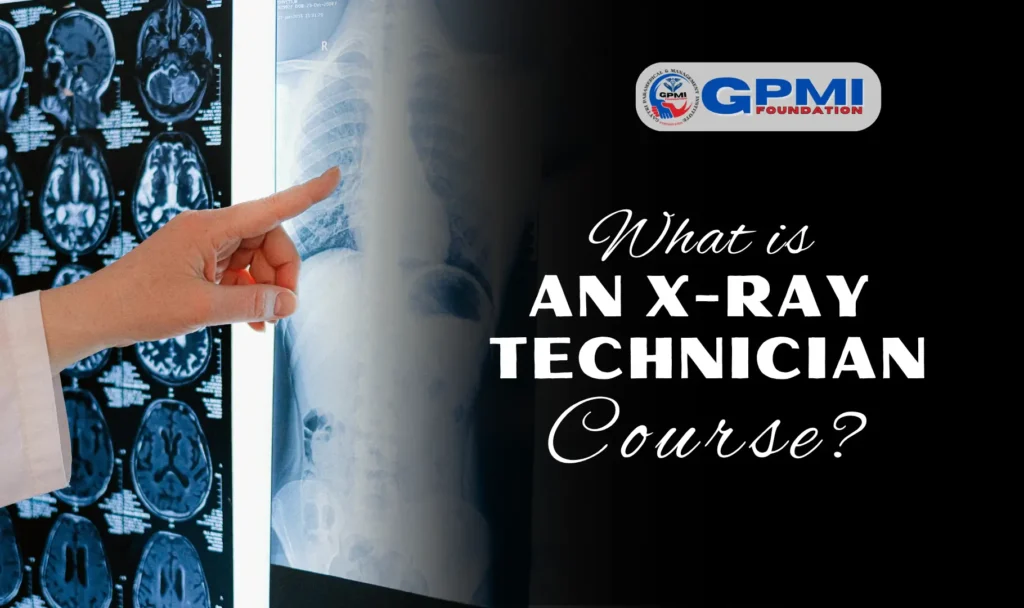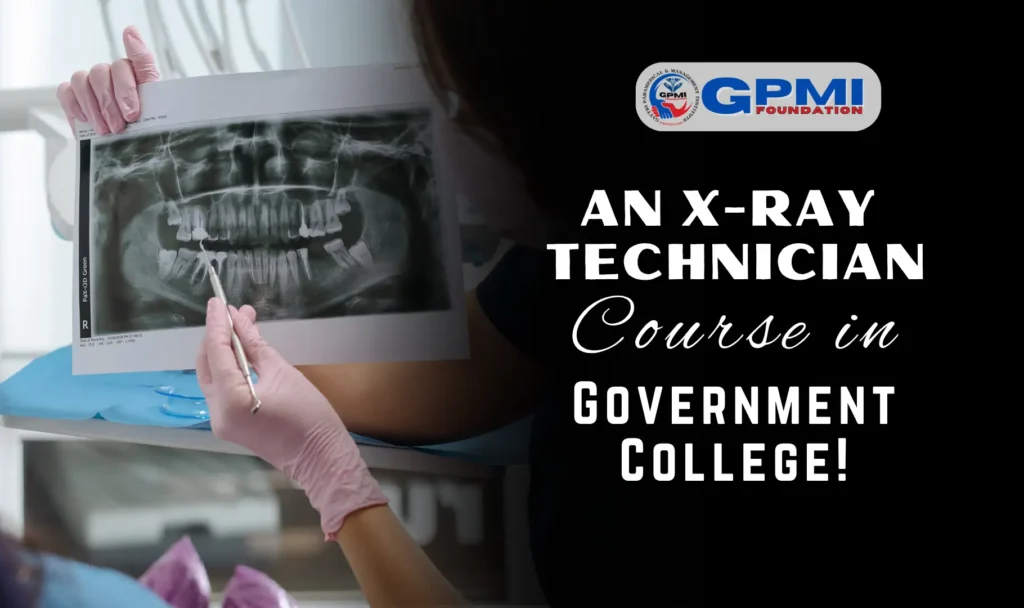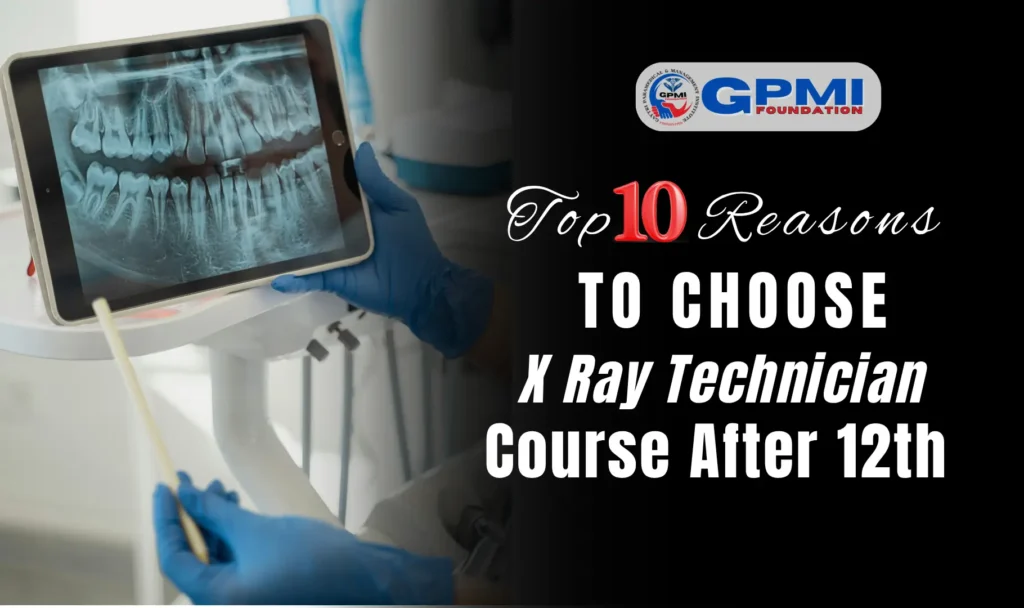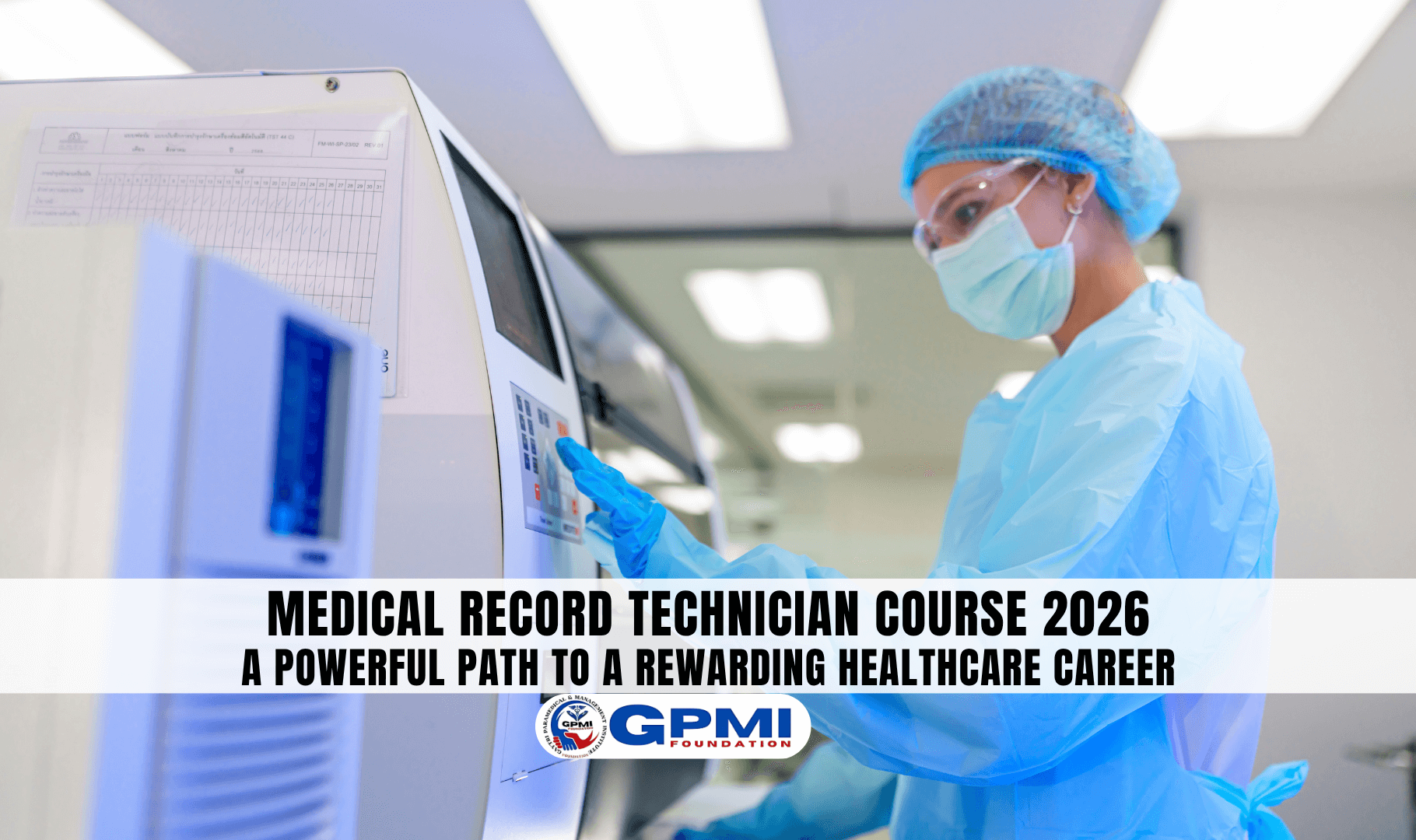Are you a student who just passed 12th and wondering what to do next? If you are interested in the medical field but don’t want to become a doctor or nurse, then the X-Ray Technician course could be the right choice for you. This course trains you to use X-ray machines and other imaging tools to help doctors find out what’s wrong with a patient.
It’s a job that is very important in hospitals, clinics, and diagnostic centers. The best part is that you can start working quickly, and the demand for X-ray technicians is growing every year. You don’t need a long medical degree to enter this field—just the right training and skills.
In this article, we will share the top 10 reasons why choosing an X-Ray Technician course after 12th can lead to a bright and secure future. But Before going ahead Let’s explore what is An X-Ray Technician course.
Table of Contents
What is An X-Ray Technician Course?

An X-Ray Technician course is a job-oriented training program that teaches students how to take images of bones and body parts using X-ray machines. These images help doctors find out if there are any injuries, fractures, or diseases inside the body.
If you’ve ever had an X-ray at a hospital, you’ve already seen the work of an X-ray technician! This course is perfect for students who have passed 12th with science and want to join the medical field quickly.
The training usually takes 1 to 2 years, depending on the course type—diploma, certificate, or degree. Students learn how to handle X-ray machines, take clear images, keep safety rules, and help patients feel comfortable during the process.
After finishing the course, you can work in hospitals, diagnostic labs, clinics, or even start your own center. It’s a respected job that brings both good salary and pride in helping others.
X Ray Technician Course 1 Year
The X-Ray Technician Course (1 Year) is a popular choice for students who want to quickly enter the healthcare field after completing 12th with science. This Diploma X-Ray Technician Course is designed to provide practical and theoretical knowledge about radiology and imaging techniques.
During the one-year program, students learn how to operate X-ray machines, position patients correctly, follow safety guidelines, and assist doctors in diagnosing internal injuries or diseases.
The course also covers basic human anatomy, radiation safety, and image processing. It is a job-oriented course that prepares students to work in hospitals, diagnostic labs, and radiology centers.
This is ideal for those looking to start a stable and respected medical career in a short time. After completing the course, students can work as X-ray technicians, radiology assistants, or imaging staff, or continue their studies for higher qualifications in the radiology field.
X Ray Technician Course Details
Let’s take a closer look at the course details, including course duration, eligibility, fee, subjects covered, and job options after completion. This will help you understand what to expect and how to plan your career.
X Ray Technician Course Duration
- The X-Ray Technician course duration depends on the type of program you choose. A certificate course usually takes 6 months to 1 year, while a diploma course is typically 1 year long.
- If you go for a degree course, such as a B.Voc. in Radiology or B.Sc. in Medical Imaging Technology, it may take 3 years to complete. The 1-year diploma course is the most popular option among students who want to start working quickly in hospitals or diagnostic labs.
X ray Technician Course Eligibility
To apply for an X-Ray Technician course, candidates must meet the following eligibility criteria:
- Minimum Qualification: 10+2 pass from any stream. For B.Sc. Course: 12th pass with Science stream (Physics, Chemistry, and Biology/Math).
- Age Limit: Generally, 17 years or above.
- Basic Skills: Interest in healthcare, attention to detail, and willingness to learn technical skills.
These X ray Technician Course qualifications ensure students are prepared for the medical and technical aspects of the course.
X Ray Technician Course Fees
The X-Ray Technician course fees depend on the type of program and the institute you choose. Below is a general idea of the fee structure:
- Certificate Course (6 months to 1 year): Fees: ₹20,000 – ₹40,000, Suitable for quick job entry and basic skills.
- Diploma Course (1 year): Fees: ₹40,000 – ₹70,000, Offers detailed training and better job scope.
- Degree Course (3 years – B.Voc./B.Sc.): Fees: ₹1,00,000 – ₹2,50,000 (entire course), Ideal for students seeking long-term career growth in radiology.
👉 Note:
Government institutes may have lower fees. Private colleges may offer better facilities but at higher cost. Many institutes provide EMI options or scholarships. Overall, the X-Ray Technician course is a cost-effective way to start a career in the growing healthcare sector.
X Ray Technician Course Subjects
The X-Ray Technician course includes a mix of theoretical and practical subjects to build essential radiology skills. Key subjects includes…
- Human Anatomy & Physiology
- Radiation Physics
- X-Ray Equipment Handling
- Radiographic Techniques
- Radiation Protection & Safety
- Patient Positioning & Care
- Image Processing & Evaluation
These subjects prepare students to work confidently in diagnostic labs, hospitals, and imaging centers.
X Ray Technician Course Salary & Jobs
After completing the X-Ray Technician course, students can find job opportunities in hospitals, diagnostic labs, clinics, and imaging centers.
The starting salary for X-ray technicians in India ranges from ₹10,000 to ₹20,000 per month, depending on location and experience. With time and skills, salaries can grow to ₹30,000 or more per month.
Job roles include:
- X-Ray Technician
- Radiology Assistant
- Imaging Technician
- CT/MRI Technician (with additional training)
- Lab Assistant in Radiology
There is high demand for skilled technicians, making this a stable and rewarding career in the medical field.
X Ray Technician Course After 10th
Students who have completed their 10th class can also pursue an X-Ray Technician course through certificate or diploma programs offered by some institutes.
Key Points:
- Minimum qualification: 10th pass (for select certificate/diploma courses)
- Duration: 1 to 2 years
- Job-ready skills with hands-on training
- Career options in clinics, labs, and hospitals
These courses focus on basic radiology skills, including handling X-ray machines, understanding human anatomy, and ensuring patient safety during imaging procedures. It’s a great option for those who want to enter the medical field early and build a career.
READ MORE: Become An Expert X-Ray Technician in 7 Easy Steps
BSc X Ray Technician Course
The B.Sc. X-Ray Technician course is a 3-year degree program that offers in-depth knowledge and advanced training in radiology and imaging. Compared to certificate, diploma and vocational courses, this course provides a stronger academic foundation, better job opportunities, and higher salary potential. Students learn about X-ray, CT, MRI, and radiation safety in detail.
Key Points:
- Duration: 3 years (degree level)
- Covers advanced imaging techniques
- Preferred in hospitals and diagnostic centers
- Offers better promotion and career growth
- Higher than diploma/vocational X-ray courses in scope and value
It’s ideal for long-term medical careers.
X Ray Technician Course in Government College

If you’re planning to build a career in radiology, choosing an X-Ray Technician course in a government college can be a smart and affordable option. Government institutes are known for their quality education, recognized certification, and lower fees compared to private colleges.
The X-Ray Technician course government institutes offer is designed to train students in operating X-ray machines, understanding radiation safety, and assisting doctors in diagnosis.
These colleges provide both theoretical knowledge and practical training in hospital settings. Most government colleges also have well-equipped labs, experienced faculty, and internship opportunities in reputed hospitals.
After completing the course, students can get jobs in government hospitals, diagnostic labs, trauma centers, and health departments.
Benefits of X-Ray Technician Course in Government College:
- Affordable course fees
- Recognized certification
- Practical training in government hospitals
- Better job opportunities in public health sector
- Scholarship opportunities for eligible students
Top 10 Government Colleges for X-Ray Technician Course in India:
- All India Institute of Medical Sciences (AIIMS), New Delhi
- Postgraduate Institute of Medical Education & Research (PGIMER), Chandigarh
- King George’s Medical University (KGMU), Lucknow
- Maulana Azad Medical College (MAMC), New Delhi
- Grant Medical College, Mumbai
- Madras Medical College, Chennai
- Government Medical College, Thiruvananthapuram
- Bangalore Medical College and Research Institute (BMCRI), Bengaluru
- Indira Gandhi Institute of Medical Sciences (IGIMS), Patna
- Government Medical College, Nagpur
To apply, students generally need to pass 10+2 with science subjects. Some institutes may conduct entrance tests. Completing the x ray technician course government program from these reputed colleges can open doors to a stable and respected career in the healthcare industry.
Top 10 Reasons to Choose X Ray Technician Course

This course offers a fast-track entry into healthcare, with opportunities to work in hospitals, clinics, and diagnostic centers. If you’ve completed your 12th, this career path offers job security, growth, and the chance to help people every day. Here are the top 10 reasons why choosing an X-Ray Technician course is a smart move:
1. Short-Term and Job-Oriented Course
One of the biggest advantages of the X-Ray Technician course is that it is short in duration. You can choose a certificate (6–12 months) or diploma course (1 year) and become job-ready quickly. This makes it ideal for students who want to start earning early and support their families or become financially independent.
2. High Demand in the Medical Field
With the rising number of hospitals, diagnostic labs, and health centers, the demand for skilled X-ray technicians is growing every year. From small towns to big cities, healthcare services need trained professionals who can handle imaging equipment and assist doctors in diagnosing patients.
3. Affordable Course Fees
Compared to long-term medical degrees, the X-Ray Technician course fees are affordable. Certificate and diploma courses generally range from ₹20,000 to ₹70,000, while degree courses may go up to ₹2.5 lakhs.
Many government colleges and institutes also offer this course at a much lower cost, making it accessible for students from all backgrounds.
4. Easy Eligibility Criteria
The X-Ray Technician course qualification is simple and easy to meet. Most institutes require:
- 10+2 pass from any streams for most institute, but some institute want students from Science (Physics, Chemistry, Biology or Math)
- Some certificate courses may accept 10th pass students as well
This makes it easy for many students to enroll without facing tough entrance exams or long selection processes.
5. Wide Range of Career Opportunities
After completing the course, you can work in:
- Government or private hospitals
- Diagnostic and imaging centers
- Orthopedic clinics
- Nursing homes
- Mobile X-ray labs
- Research labs and forensic labs
You can also choose to specialize further in CT scans, MRI, or ultrasound imaging with additional training.
6. Steady Salary and Job Security
X-ray technicians earn a steady income, even at the entry level. Starting salaries range from ₹10,000 to ₹20,000 per month, and with experience, it can go up to ₹30,000 or more.
Since this role is essential in almost every hospital, job security is strong. Even during economic downturns or pandemics, healthcare professionals remain in demand.
7. Opportunity to Work with Modern Medical Technology
As an X-ray technician, you’ll get hands-on experience with advanced imaging machines and medical technologies. From digital X-rays to portable imaging devices, you will learn to operate high-end equipment and support doctors in diagnosing injuries, fractures, infections, and diseases.
It’s a tech-savvy role that keeps you updated with medical innovations.
8. Respect and Role in Patient Care
Although X-ray technicians don’t perform surgeries or prescribe medicines, their work plays a vital role in patient care. Accurate X-ray imaging helps doctors make correct diagnoses.
As a technician, you’ll be working closely with patients, ensuring their comfort and safety during the process, which builds a sense of pride and responsibility.
9. Growth Potential and Higher Studies
If you want to continue learning after your certificate or diploma, there are plenty of options:
- B.Sc. in Radiology / Medical Imaging Technology
- B.Voc. in Radiology & Imaging Technology
- Advanced certificate programs in MRI, CT Scan, etc.
- Postgraduate diploma courses in radiology
This flexibility allows you to upgrade your skills and move into senior roles like Radiology Manager, Imaging Specialist, or even a teacher/trainer in the field.
10. Career Options Abroad
Trained X-ray technicians also find job opportunities in countries like the USA, Canada, UK, Australia, and Gulf countries. With some additional certification or licensing, you can work in foreign hospitals and earn a higher income.
Medical imaging professionals are respected worldwide, and this career can open doors to global opportunities.
READ MORE: B Voc Course (Bachelor in Vocation) in Paramedical Science
Conclusion
Choosing the X-Ray Technician course is more than just picking a job – it’s a step toward a rewarding and respected career in healthcare. Whether you want a quick-start career after 12th or a long-term professional path in medical imaging, this course has it all – affordability, job security, and growth.
So if you’re passionate about healthcare, enjoy working with machines, and want to be part of a life-saving profession without spending years in college, the X-Ray Technician course could be your perfect match.
What is the highest paying X-ray job?
The highest paying X-ray job is typically that of a Radiologist Assistant (RA) Salary: ₹8–15+ LPA in India (₹50 LPA+ abroad) or an advanced imaging specialist like an MRI or CT Scan Technologist with years of experience and specialization. Salary: ₹4–10 LPA (more in private or corporate hospitals)
What is the scope of X ray technician?
The scope of an X-ray technician is wide and growing, especially with the rise in hospitals, diagnostic centers, and medical imaging needs. This career offers strong job opportunities, steady income, and room for growth in both India and abroad.
What is the lowest salary for an X ray tech?
The lowest salary for an X-ray technician in India typically starts from ₹8,000 to ₹15,000 per month for freshers or those working in small clinics, especially in rural or semi-urban areas.
Is an X ray technician a doctor?
No, an X-ray technician is not a doctor. They are trained healthcare professional who operates X-ray and imaging machines to take images of the human body. They assist doctors in diagnosing medical conditions but do not diagnose or treat patients themselves.







